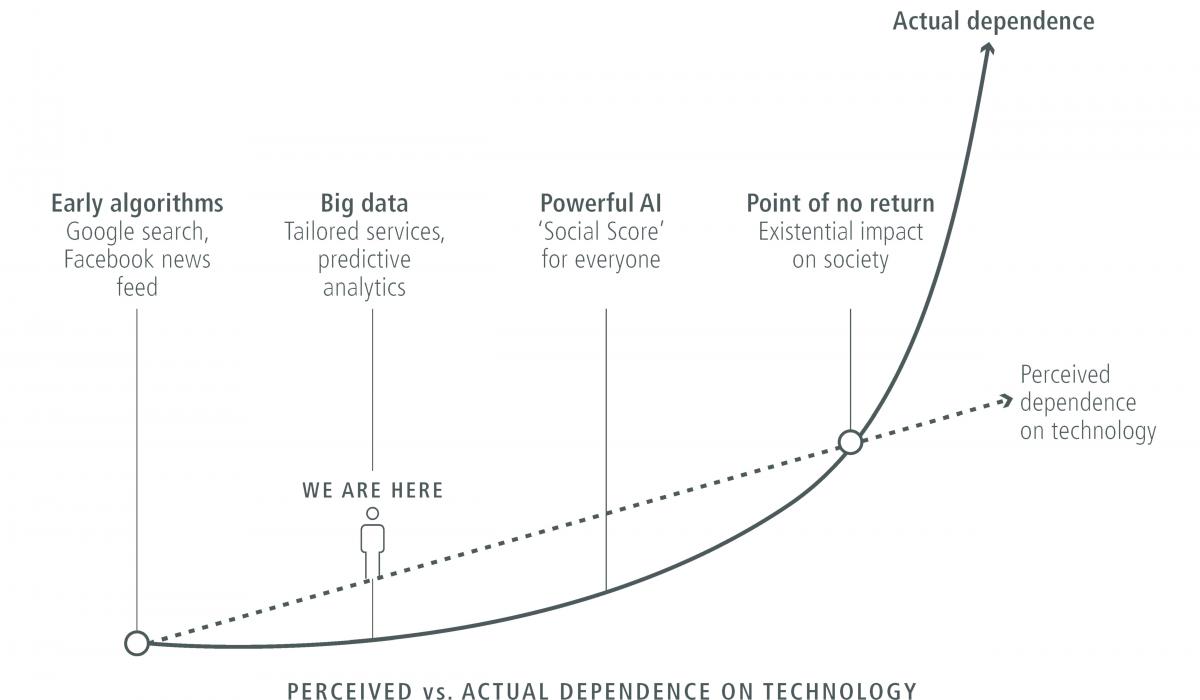Cold War II: A technology war with two dimensions

If you listen closely to leading business figures from Asia, you get a sense for their economic fears and expectations. After visiting a leadership summit in Singapore, I am ever more convinced that we will be facing a new global Cold War, which will be fought over technology dominance. Europe needs to prepare for that.
The technology war has two dimensions: the economic dimension and the political dimension. Starting with the economic dimension, technology creates and destroys entire industries. For example, the share prices of three leading European banks have fallen by 90% since 2007, and technology has also decimated companies such as Kodak and destroyed Thomas Cook.
How does this happen? We tend to look at change in a linear way, but technology works in a logarithmic way and underperforms linear expectations in the early years. Then the pace of technological change accelerates and within two to six years, old industries have gone and tech dependence has become overwhelming. Digital platforms such as Google, Amazon and Netflix have become the infrastructure for our daily lives—and none of them are European.
The other part of Cold War II is the political dimension. The Scottish commentator Niall Fergusson pointed out that we now have populism for the first time in very many years, and this is because of the growth of social media which give politicians a direct line to voters. The filters that used to take out the lying and emotions in traditional media have been watered down or even eliminated.

Today’s youth are constantly influenced by technology. In Europe, they spend an average of three hours a day on social media—over 13,000 hours by the time they complete their university studies, which is the equivalent of seven years of office working hours. Attention has become the new most critical infrastructure, with direct communications and no gatekeepers on Twitter, curated newsfeeds on Facebook shaping our opinions, and artificial intelligence shaping our perceptions.
Those tech platforms are free, depriving people of their time and delivering the prerequisites for populism. People say they want to use social media for 12 minutes, but they spend an average of an hour at a time on them. Tech platforms try to keep us engaged as long as possible, using AI to analyse your viewing habits and take you to the guilty pleasures and weak spots of your peers. Every click takes you to content that is more extreme than what you started with, and outrageous content such as Infowars.com wins.

More than a billion hours is watched daily on YouTube, 70% generated through recommendations. Emotional headlines attract a 20% higher click rate, while fake news spreads six times faster than real news. Donald Trump wins over more truthful and factual candidates such as Hillary Clinton, which is why I call this Cold War II. Both the economy and politics have become highly dependent on technology.
The other thing that I took from the Singapore summit is that for the 100 most valuable tech companies, South-East Asia is 50% dependent on the US and 50% dependent on China. The same is true for Europe, and we are really dependent on them both. Which means that technology can be used as a major foreign policy pressure point, as can be seen from the US trade sanctions against Iran.
 This is because dominance can be exerted through sanctions imposed over the payment infrastructure. More than 60% of European retail spending is processed through Visa, Mastercard and American Express, which makes Europe hugely dependent on the US control over payments. China is largely independent of any foreign payment infrastructure, but is increasing its influence in global financial infrastructure through its investment in fintech companies, giving it control of almost half of the global investment infrastructure.
This is because dominance can be exerted through sanctions imposed over the payment infrastructure. More than 60% of European retail spending is processed through Visa, Mastercard and American Express, which makes Europe hugely dependent on the US control over payments. China is largely independent of any foreign payment infrastructure, but is increasing its influence in global financial infrastructure through its investment in fintech companies, giving it control of almost half of the global investment infrastructure.
So what can tech investment and venture capital do to secure Europe’s domestic economic future? The average half-life of companies in the S&P 500 index in the US has fallen since 1965 from 30 years to 15 years which means that 7% of its capital is recycled each year, bringing in new finance for tech innovation. If this were to be replicated in Germany, more than €65 billion would have to be replaced each year to retain the cumulative DAX30 value, which would require systematically putting money into the system.
 If we do not do that, we will not gain political independence on global markets and offset economic substitution on our domestic markets. France has understood the urgency of the need for action and is starting to put money into its tech ecosystems. In September, President Emmanuel Macron unveiled commitments from insurers and asset managers for €5 billion of investment to nurture home-grown fledgling tech start-ups and create a cohort of highly valued heavyweights.
If we do not do that, we will not gain political independence on global markets and offset economic substitution on our domestic markets. France has understood the urgency of the need for action and is starting to put money into its tech ecosystems. In September, President Emmanuel Macron unveiled commitments from insurers and asset managers for €5 billion of investment to nurture home-grown fledgling tech start-ups and create a cohort of highly valued heavyweights.
Sadly, the German government is refusing to act, even though its coalition agreement says that digital competitiveness will be strongly supported financially. The necessity to act for the economy and politics is clear, and financing digital would pay off positively up to 15€ returns a year. Yet nothing is happening in Europe’s largest economy.
This article has been published in the Lakestar Briefing, Issue #7, December 2019. For more information on Lakestar please visit www.lakestar.com.
Lakestar will participate in the Campden Wealth European Families in Business Conference in Munich on 30 June-1 July and the European Family Office Conference in London on 4-5 November.







